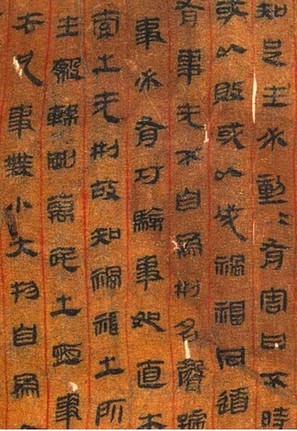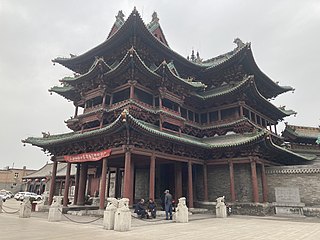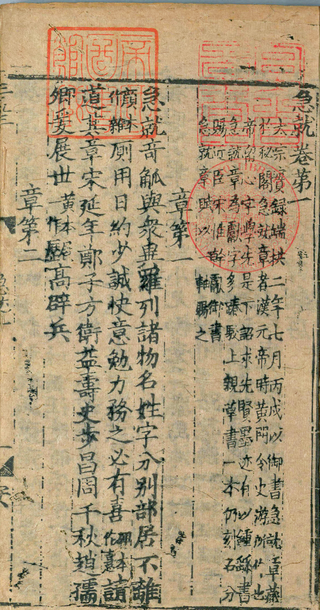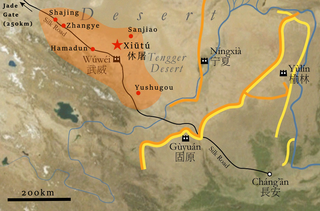Related Research Articles

Sogdia or Sogdiana was an ancient Iranian civilization between the Amu Darya and the Syr Darya, and in present-day Uzbekistan, Turkmenistan, Tajikistan, Kazakhstan, and Kyrgyzstan. Sogdiana was also a province of the Achaemenid Empire, and listed on the Behistun Inscription of Darius the Great. Sogdiana was first conquered by Cyrus the Great, the founder of the Achaemenid Empire, and then was annexed by the Macedonian ruler Alexander the Great in 328 BC. It would continue to change hands under the Seleucid Empire, the Greco-Bactrian Kingdom, the Kushan Empire, the Sasanian Empire, the Hephthalite Empire, the Western Turkic Khaganate and the Muslim conquest of Transoxiana.

Zhuang Zhou, commonly known as Zhuangzi, was an influential Chinese philosopher who lived around the 4th century BCE during the Warring States period, a period of great development in Chinese philosophy, the Hundred Schools of Thought. He is credited with writing—in part or in whole—a work known by his name, the Zhuangzi, which is one of two foundational texts of Taoism, alongside the Tao Te Ching.

Empress Dowager Bo (薄太后), personal name lost into history, was an imperial concubine of Emperor Gaozu of Han. She was also known as Consort Bo (薄姬) during the life of the Emperor, and more formally as either Empress Dowager Xiaowen (孝文太后) or (rarer) Empress Gao (高皇后). Despite being a concubine of lower standing, her son, Liu Heng, became Emperor Wen of Han, cementing her place in history. The year of her birth is not known. She died on 9 June 155 BC.

The Yinqueshan Han Slips are ancient Chinese writing tablets from the Western Han dynasty, made of bamboo strips and discovered in 1972. The tablets contain many writings that were not previously known or shed new light on the ancient versions of classic texts.
Wei Zhuang, style name Duanyi (端已), was a Chinese poet and late Tang dynasty and early Five Dynasties and Ten Kingdoms period historical figure best known for his poetry in shi and ci styles.

The Huangdi Sijing are long-lost Chinese texts, manuscripts of which were discovered among the Mawangdui Silk Texts in 1973. Also known as the Huang-Lao boshu, they are thought by modern scholars to reflect a lost branch of early syncretist Daoism, referred to as the "Huang–Lao school of thought" named after the legendary Huangdi and Laozi. One finds in it "technical jargon" derived of Taoism, Legalism, Confucianism and Mohism.

The Shuihudi Qin bamboo texts are early Chinese texts written on bamboo slips, and are also sometimes called the Yúnmèng Qin bamboo texts. They were excavated in December 1975 from Tomb #11 at Shuìhǔdì (睡虎地) in Yunmeng County, Hubei, China. The tomb belonged to a Qin administrator c. 217 BCE.
The Zhangjiashan Han bamboo texts are ancient Han dynasty Chinese written works dated 196–186 BC. They were discovered in 1983 by archaeologists excavating tomb no. 247 at Mount Zhangjia (張家山) of Jiangling County, Hubei Province. The tomb was built for an early Western Han era official who had died in 186 BC. The texts were written on traditional bamboo slips connected by cords into rolled scrolls. The written works included legal case precedents, literature on medicine including Book on Vessels, mathematics, military strategy, and a calendar with dates ranging from 202 BC to 186 BC.

Jiexiu is a county-level city in the central part of Shanxi Province, China. It is under the administration of the prefecture-level city of Jinzhong and is located in the latter's western confines. Notable sites in and around Jiexiu include Mount Mian, Zhangbi Fortress, Houtu Temple and Xianshenlou.
Huang–Lao was the most influential Chinese school of thought in the early Han dynasty, having its origins in a broader political-philosophical drive looking for solutions to strengthen the feudal order as depicted in Zhou politics. Not systematically explained by historiographer Sima Qian, it is generally interpreted as a school of Syncretism, developing into a major religion, the beginnings of religious Taoism.
Shuanggudui is an archeological site located near Fuyang in China's Anhui province. Shuanggudui grave no. 1, which belongs to Xiahou Zao (夏侯灶), the second marquis of Ruyin (汝陰侯), was sealed in 165 BCE in the early Han dynasty. Excavated in 1977, it was found to contain a large number of texts written on bamboo strips, including fragments of the Classic of Poetry and the Songs of the South, a text on breathing exercises, a "year table" (年表) recounting historical events, a manual on dogs, a version of the I Ching (Yijing) that differs from the received one, and artifacts including the oldest known cosmic board, a divinatory instrument. Like Mawangdui and Guodian, two other tombs from the area of the old state of Chu, the Shuanggudui find has shed great light on the culture and practices of the early Han dynasty.

The Jijiupian is a Chinese character primer that was compiled by the Han dynasty scholar Shi You around 40 BCE. Similar to an abecedarium, it contains a series of orthographic word lists, categorized according to character radical, and briefly explained in rhymed lines. In the Qin and Han dynasties, several similar othographic primers were in circulation, such as Cangjiepian, but the Jijiupian is the only one that survived for two millennia.

Gongsun Hong was a senior official in the Western Han dynasty under Emperor Wu. Together with the more famous Confucian scholar Dong Zhongshu, Gongsun was one of the earliest proponents of Confucianism, setting in motion its emergence under the Han court. The ideals and decrees both promoted would come to be seen as values-in-themselves, becoming the "basic elements, or even hallmarks" of Confucianism, although not necessarily officially during his lifetime. While first proposed and more ardently promoted by Dong, the national academy and Imperial examination, then considered radical, did not come into existence until they were supported by the more successful Gongsun. Their establishment set a precedent that would last into the twentieth century.
The Patrick D. Hanan Book Prize for Translation is given biennially to an outstanding English translation of a significant work in any genre originally written in Chinese or an Inner Asian Language, from any time period.
The Maishu (脈書), translated into English as the Book on Vessels, is an early Han dynasty medical text that discusses the vessels of the body. It was unearthed as part of the Zhangjiashan cache of texts in the 1980s. It was found with another medical text, Book on Therapeutic Pulling (Yinshu), as well as two legal texts, a maths book and a dialogue illustrating military and political issues.
Palace Attendant was a title in Imperial China comparable to that of Chief Minister, also known as Grand chancellor or Counselor-in-chief. These are in turn collective terms designating the chief policy maker of the central government in Imperial China. They designated the head of the central government during the Qin and Han dynasties and during the Three Kingdoms period, the "highest official advisor to the Emperor."

The Yinshu (引書) is an ancient Chinese medical text from the Western Han dynasty discovered in 1983 as part of the Zhangjiashan Han bamboo texts.

Xiutu was a king in the Hexi corridor of the Gansu region, west of Wuwei, during the 2nd century BCE.

The Shajing culture, is an ancient Iron Age culture in the area of Gansu, to the northwest of the Central Plains of China. The village of Shajing is about 250 km northwest of Wuwei, while the village of Yushugou, another important Shajing site, is about 140 km to its southeast. The Shajing culture is closely associated to the Saka culture of the Xinjiang, the Ordos culture of Inner Mongolia and the Upper Xiajiadian culture of Liaoning. It was a culture essentially based on pastoral nomadism. As of 2017, seven sites had been excavated and almost as many fortified settlements built with walls of compacted loess.
References
- ↑ "Robin D.S. Yates". McGill University History and Classical Studies. Retrieved 1 August 2024.
- ↑ "Robin Yates". McGill University East Asian Studies. Retrieved 1 August 2024.
- ↑ "Distinguished Lectures in Humanities: On the Military in the Qin and Early Han: New Evidence from Excavated and Recovered Sources". Hong Kong Polytechnic University. 2024. Retrieved 1 August 2024.
- ↑ "Prosecuting Functionaries in Eastern Han China: Evidence from the Newly Excavated Wuyi guangchang Documents". Stanford University Center for East Asian Studies. 2022. Retrieved 1 August 2024.
- ↑ "HKBU receives donation in celebration of the 40th Anniversary of Department of History". Hong Kong Baptist University Foundation. 11 January 2018. Retrieved 1 August 2024.
- ↑ Reviews of Law, State, and Society in Early Imperial China include:
- Goldin, Paul R. (April 2017). "Law, State, and Society in Early Imperial China: A Study with Critical Edition and Translation of the Legal Texts from Zhangjiashan Tomb no. 247. By Anthony J. Barbieri-Low and Robin D. S. Yates . (Sinica Leidensia 126) 2 vols. pp. cxiv, 1416. Leiden and Boston, Brill, 2015". Journal of the Royal Asiatic Society. 27 (2): 332–335. doi:10.1017/S1356186316000626.
- Sanft, Charles (2017). "Anthony J. Barbieri-Low, and Robin D. S. Yates . Law, State, and Society in Early Imperial China: A Study with Critical Edition and Translation of the Legal Texts from Zhangjiashan Tomb no. 247. Leiden: Brill, 2015. 2 vols". Early China. 40: 317–320. doi:10.1017/eac.2017.7.
- Korolkov, Maxim (2017). "Law, State, and Society in Early Imperial China: A Study with Critical Edition and Translation of the Legal Texts from Zhangjiashan Tomb no. 247, vols. 1, 2. By Anthony J. Barbieri-Low and Robin D.S. Yates . Leiden and Boston: Brill, 2015. cxiv + 1416 pp. $389.00, €299.00 (cloth, ebook)". Journal of Chinese History. 1 (2): 369–371. doi:10.1017/jch.2017.8. ResearchGate : 315469850
- Sou, Daniel Sungbin (December 2021). "Law, State, and Society in Early Imperial China: A Study with Critical Edition and Translation of the Legal Texts from Zhangjiashan Tomb No. 247". Journal of the American Oriental Society. 138 (2). doi:10.7817/jameroriesoci.138.2.0437. ProQuest 2093188790. ResearchGate : 364278366
- Bourgon, Jérôme (2020). "Law, State and Society in Early Imperial China: A Study with Critical Edition and Translation of the Legal Texts from Zhangjiashan Tomb no. 24, written by Anthony J. Barbieri-Low and Robin D.S. Yates, 2015". T'oung Pao. 106 (3–4): 459–465. doi:10.1163/15685322-10634P06.
- ↑ Chatterton, Jocelyn (January 2015). "Yuri Pines, Lothar von Falkenhausen, Gideon Shelach, Robin D. S. Yates (eds.), Birth of an Empire: The State of Qin Revisited". Journal of Global Faultlines. 2 (2): 54–56. doi:10.13169/jglobfaul.2.2.0054.
- ↑ Ho, Clara Wing-chung (2010). "[Book Review] Robin D. S. Yates. Women in China from Earliest Times to the Present: A Bibliography of Studies in Western Languages. Leiden and Boston: Brill, 2009. 234 pp. EUR99/US$141. ISBN 9789004176225". Nan Nu. 12 (2): 357–359. doi:10.1163/156852610X545921.
- ↑ Meyer, Andrew (Summer 1997). "FIVE LOST CLASSICS: Tao, Huang-Lao, and Yin- Xing in Han China By Robin D. S. Yates. Ballantine Books. 464 pp. $27.50". Wilson Quarterly. 21: 103–104.
- ↑ Reviews of Washing Silk include:
- Wang, C. H. (July–September 1990). "Reviewed Work: Washing Silk: The Life and Selected Poetry of Wei Chuang (834?-910) by Robin D. S. Yates, Wei Chuang". Journal of the American Oriental Society. 110 (3): 559–560. doi:10.2307/603220. JSTOR 603220.
- Cayley, John (1990). "Reviewed Work: Washing Silk: The Life and Selected Poetry of Wei Chuang (834?-910) by Robin D. S. Yates, Wei Chuang". Bulletin of the School of Oriental and African Studies, University of London. 53 (1): 172–173. doi:10.1017/S0041977X00021777. JSTOR 619020.
- Birrell, Anne (1990). "Reviewed Work: Washing Silk: The Life and Selected Poetry of Wei Chuang (834?-910) by Robin D. S. Yates, Wei Chuang". Journal of the Royal Asiatic Society of Great Britain and Ireland. 122 (1): 205–207. doi:10.1017/S0035869X00108408. JSTOR 25212625.
- Leung, K. C. (Autumn 1989). "Reviewed Work: Washing Silk: The Life and Selected Poetry of Wei Chuang (834?-910) by Wei Chuang, Robin D. S. Yates". World Literature Today. 63 (4): 737–738. doi:10.2307/40145748. JSTOR 40145748.